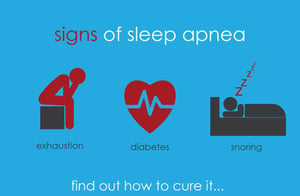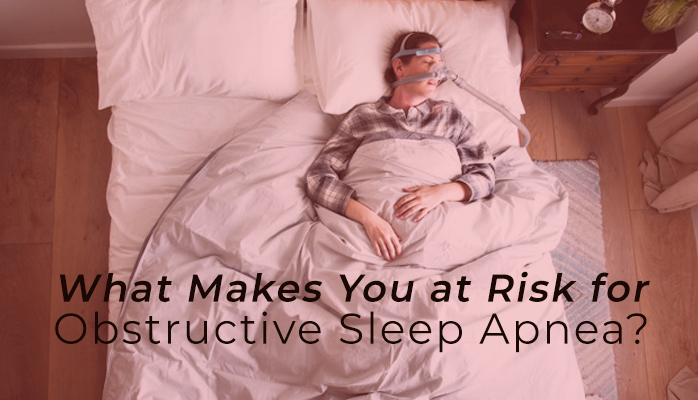Sleep apnea is a condition characterized by frequent pauses in breathing during the night, ranging from 40-100+ times. These interruptions in breathing cause temporary awakenings to resume breathing, disrupting your sleep without you even realizing in the morning.
There are three types of sleep apnea:
- Obstructive sleep apnea (OSA) - An obstruction in your airway hinders your ability to breathe, as the back of your throat collapses and blocks the passage of air.
- Central sleep apnea (CSA) – the brain fails to transmit accurate signals to the muscles responsible for regulating breathing.
- Complex sleep apnea – you exhibit traits of both OSA and CSA.
Over time, sleep deprivation caused by sleep apnea can shorten overall life expectancy, lower overall life quality, and initiate or worsen other medical conditions. Therefore, identifying risks for OSA is important for prevention or improvement of OSA symptoms.
Physiological risk factors for sleep apnea
Physiological risk factors are physical attributes that increase or decrease your risk for developing OSA. Common physiological risk factors include:
- Obesity
- Thick or large neck
- Smaller airways
- Enlarged tonsils
- Deviated septum
- Large tongue
These attributes are often changeable, and can be affected through lifestyle changes or surgical intervention.
Medical risk factors for sleep apnea
Medical risk factors are medical (i.e., diseases, conditions) and biological factors (e.g., genes) that influence OSA development or severity. They include the following:
- Diabetes
- Genetics/family history
- Certain medical conditions that cause sleep apnea (rare)
- Certain medications for health reasons (such as pain relievers)
- Age/Sex (older men are most common demographic for sleep apnea)
- High blood pressure
- Chronic nasal congestion
Lifestyle risk factors for sleep apnea
Lifestyle factors are behaviors and habits that impact your breathing. Some common influences are:
- Sleeping on your back
- Smoking
- Drinking excess alcohol
- Narcotic use (i.e., painkillers)
Fortunately, since lifestyle factors are behaviors and habits, you can change them more easily than physiological or medical risk factors:
- Change sleep position
- Quite smoking/drinking
- Find alternative medication to narcotics
Symptoms of Sleep Apnea

Identifying symptoms of sleep apnea may be challenging, especially for those without a bed partner to identify the obvious symptoms of snoring, choking, and pauses in breathing. Regardless, some common symptoms are [WebMD]:
- Repeated pauses in breathing
- Loud, chronic snoring
- Morning fatigue
- Morning headaches
- Excessive daytime sleepiness
- Waking up choking/gasping
- Mood disruptions, such as constant irritability, brain fog, etc.
- Dry mouth upon waking
- Low stress management
- Struggles with depression or anxiety
- Reduced sex drive
Treatment for Sleep Apnea
Most individuals managing sleep apnea opt for CPAP therapy, utilizing devices that deliver continuous positive airway pressure. In most cases, surgical intervention is not necessary. For milder forms of sleep apnea, non-medical approaches may be suggested by your healthcare provider.
If you live in Alaska and need to confirm a sleep apnea diagnosis, please click the orange button below to take a free online sleep test and talk with one of our sleep health professionals.


